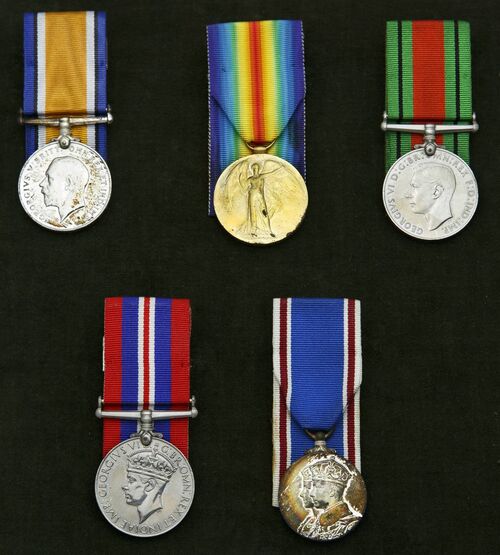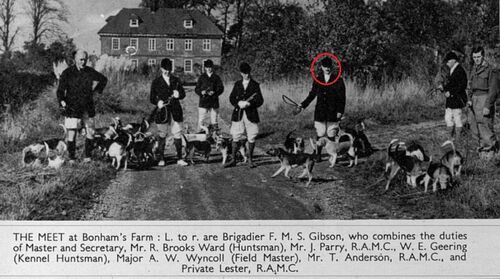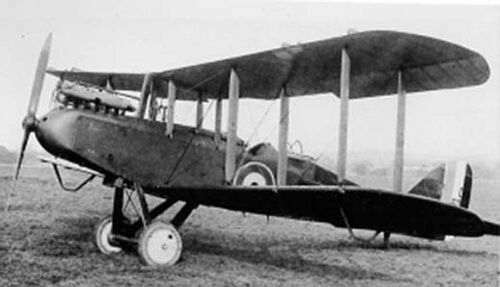Auction: 24001 - Orders, Decorations and Medals
Lot: 97
Sold by Order of the Family
Five: Major A. W. Wyncoll, The King's Own Royal Regiment, late 2nd Lieutenant, Royal Air Force, who was shot down and taken a Prisoner of War in 1918
British War and Victory Medals (2/Lieut. A. W. Wyncoll. R.A.F.); Defence and War Medals 1939-45; Coronation 1935, mounted individually for wear in a wooden case, the first two heavily polished to the obverse, very fine (5)
Austin Wrench Wyncoll was born at Buckfastleigh, Devon on 19 April 1895, the son of Emily and Dr John Wyncoll. Educated at Elstow School, Kempston he decided to follow in his father’s footsteps, completing his entrance exam for Victoria University of Manchester in September 1913 as a medical student.
He was still there the next year on the outbreak of the Great War, being commissioned 2nd Lieutenant with The King’s Own (Royal Lancaster Regiment) from the Special Reserve. Posted to France on 21 May 1916 he was promoted temporarily Lieutenant there on 1 August 1917, for as long as he was employed with the Battalion. However, Wyncoll was transferred to the Royal Flying Corps on 22 February 1918 and returned to the rank of 2nd Lieutenant.
Returning to Britain, Wyncoll was trained at Eastchurch before being posted as an Observer to 108 Squadron on 18 July 1918, when the Squadron was posted to Capelle, Dunkirk. They were equipped with two-seater DH.9 bombers and flying raids over Belgium. Wyncoll was flying as Observer for Captain Robert Ingram on 18 August 1918 on a raid over Bruges. They had successfully completed their mission and were returning to Dunkirk when they were shot down by anti-aircraft fire over Ostend.
From Ostend they were taken to Rastatt Camp, Baden and from there again to Lake Baden. He was not to be a prisoner long however, with the end of the war seeing him returned to Dover on 11 December 1918. Posted to the 14th Training Depot Station Wyncoll continued to serve until 29 July 1919 when he was transferred back to the Royal Lancaster Regiment.
He was stationed with them in Rangoon when receiving his medals, they are noted as being re-issued at a later date. Returning to Britain Wyncoll carried the Regimental Colour when the 1st Battalion was inspected by Earl Haig before the unveiling of the Westfield Village War Memorial.
Promoted Captain on 20 April 1925 he was to serve as a Company Commander for some time. Whilst in this role Wyncoll was involved in a Court Marshall incident, being struck in the face by a Private whom he had placed on a charge. The Leeds Mercury 16 May 1931, states:
‘It was stated that after an inquiry, in which Captain Wyncoll had charged Prickler with insubordination, the man broke from his escort, and struck the captain a blow in the face.
For the defence it was contended that Prickler had met with a number of setbacks which he attributed to Captain Wycoll and was provoked to such an extent that he lost his head.’
Still in Britain Wyncoll was to find himself in the dock before long when, in 1935, he was fined for ‘driving without due car and attention, in a civil court. Despite this mishap his continued service saw him promoted Major on 1 August 1938. Retiring on 20 June 1939 he was not able to enjoy himself for long however and soon returned to the Colours, being listed with the Reserve of Officers in 1940.
Posted back to his old unit Wyncoll saw home serve with the King’s Own Regiment for the during duration of the war. He returned to the Reserve of Officers after November 1944 and, having exceeded the age limit, retired again on 24 August 1945. In his retirement Wyncoll was a member of the Aldershot Beagles, being listed as their Field Master in 1952; sold together with copied research including London Gazette entries, newspaper extracts, M.I.C. and service records.
Subject to 20% VAT on Buyer’s Premium. For more information please view Terms and Conditions for Buyers.
Sold for
£290
Starting price
£270









